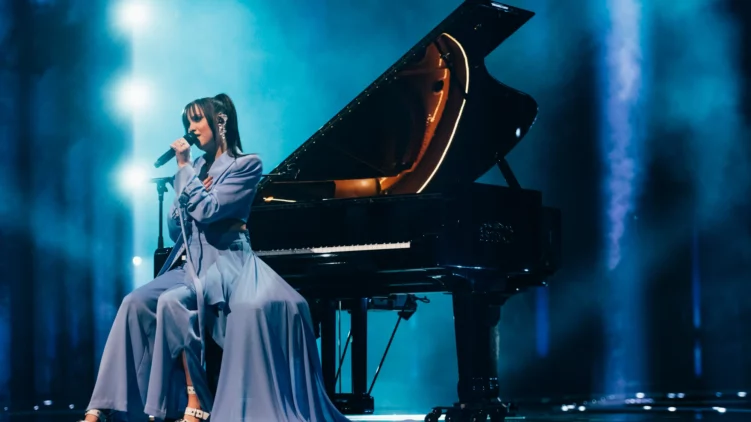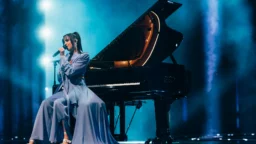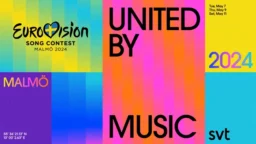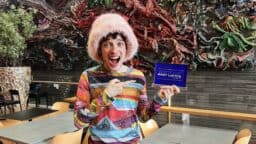When, a few weeks before Eurovision, asked if she would like to share something that no one knows about her, Alika (20) says: ‘We all have secrets. But I’m always very honest to myself and others.’
A beautiful answer, but it seems to contradict the lyrics of Bridges, the song with which she represents Estonia at the Eurovision Song Contest 2023 – a song that was written in the Netherlands. On a day that started off badly…
Lies
Bridges is primarily about not being honest with yourself. About deceiving yourself. The opening lines:
Now I’m heading home
to solid ground,
realised that all the lies I’ve told myself have died.
Bridges
Alika: ‘All people lie to each other, it’s in our nature. But we’ve forgotten that we also lie to ourselves. Because how are we supposed to find out we do? That’s very difficult. My song is called Bridges because it’s about the situation you find yourself in when the bridge to yourself has been demolished. However, I do believe that everyone has the power within them to build a new bridge. We can always start anew and not look back. That’s why this song is also hopeful.’
A world of bridges
Yes, hopeful. Further along in the ballad-with-climaxes, Alika and Flemish lyricist Nina Sampermans express this hope in the following way:
There is always time to get back on track.
and:
That I forgive myself for all the lies I said before.
and:
Now I see myself building up a world of bridges.
Stumbling
But ask how this encouraging song was written, and you’ll hear a much more troubled story. A story that took place at the Tramkade in our Dutch city of ‘s-Hertogenbosch. Or, as Alika calls it: ‘Surtokenbosh.’
Arcade
And that story begins at least fifteen years earlier.
Alika: ‘From the age of four, I knew I wanted to be a singer, and when I was eight, I saw the Junior Eurovision Song Contest on television. By the time I was nine, I was all ready for it: I wrote a song, but unfortunately, Estonia does not participate in the junior version.’
She does sign up for all possible talent shows, the largest of which is the Estonian version of Idols, which she wins in 2021, and in which she sings a cover of the victorious Eurovision song from 2019, Duncan Laurence’s Arcade.
Some action
After Idols, she is ready for the Estonian Eurovision preselection. Alika: ‘My heart told me it needed some action.’
She wants to aim high and has her manager get in touch with the Dutch producer of Arcade, Wouter Hardy. Besides Arcade, he also wrote the song that came third in 2021, Tout l’univers, by Gjon’s Tears from Switzerland.
No and yes
From here, we can follow the story along two tracks, as both Alika and Wouter have spoken about it in interviews.
Wouter: ‘I initially said no when I got the request from Alika’s manager. I didn’t aspire to be known as “that Eurovision producer”.’
Alika: ‘Wouter said he wouldn’t have time for at least six months. But after a lot of back and forth emailing, it became a yes.’
Wouter: ‘After a while I thought: why not.’
Lying on the couch
And so, at the end of 2022, Alika travelled to Wouter Hardy’s studio in Den Bosch.
Alika: ‘From the moment we first saw each other, I felt that my energy and his energy matched well. But on the second day, we started working on something that I wasn’t feeling. I had a kind of anxiety attack. It was a bit overwhelming for me to go all the way to the Netherlands and meet that fantastic producer, and I was afraid that the session was failing. Wouter saw this and suggested we go for lunch and talk about what I was feeling. At first, I just wanted to lie on the couch in the studio, being just sad for a while. But I realised that wouldn’t be a good idea.’
Washing hands
Wouter: ‘As we walked through Den Bosch, I asked her about her parents, her childhood, and then she started to speak. She also had family in Ukraine, was dealing with the war. It was heartfelt, she started crying and those emotions inspired me.’
Alika: ‘I really opened up to him. We ate and returned to Wouter’s studio, where I quickly went to wash my hands, but when I came back, Wouter was playing the intro of what would later become Bridges. I sat on the floor, which for me is the best place to work on new music. And within three hours, we wrote the song.’
Frustration
Bridges has become a signature Wouter Hardy song: it starts small, with just the piano, and then builds up more and more to an opening chorus, with an emotional finale at the end. And of course, strings are used and the whole thing has a cinematic feel.
Alika: ‘Not only was it the right choice for Eurovision, but the song really originated from me, from my bad day. I think the best songs come from frustration.’
She easily won the national final in Tallinn and is now the twenty-seventh entry for Estonia, a country that debuted in 1994.
Honesty
Wouter: ‘Alike is still very young, but she sings so well that I expect she will convey the song effectively.’
Alika: ‘People often ask me where my voice comes from. Physically, I really don’t know, I’m just a small girl. But psychologically: everything starts from honesty.’
Photo: Sarah Louise Bennett/EBU






